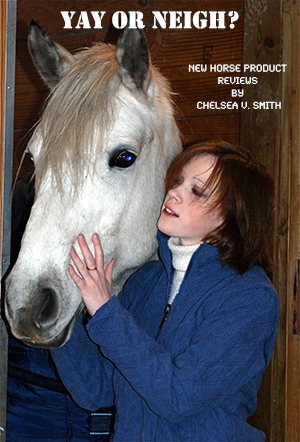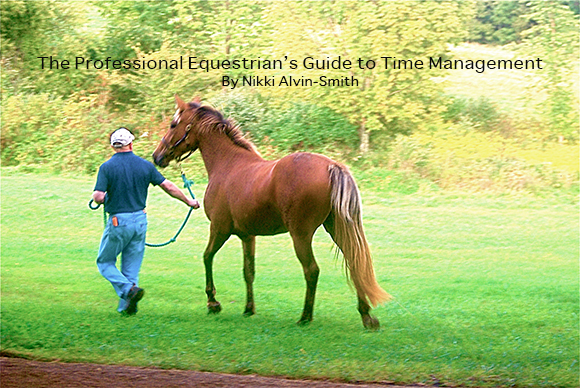The Professional Equestrian’s Guide to Time Management
By Nikki Alvin-Smith
Time management is key to becoming a successful professional in equestrian sport. Your passion for the job will be tested with the ups and downs that come along with horse competition and horse ownership. At the top echelons of the sport, competing and training horses is a lifestyle and not a 9-5 occupation, and managing your time effectively means you need to put your competition horses and their training before everything else in the day.
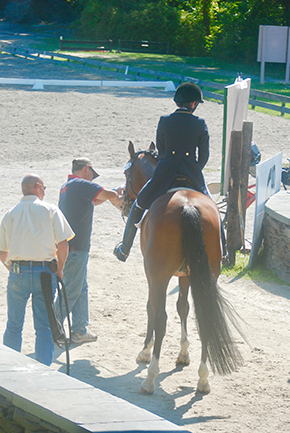 By necessity you will find it is better to be a lark than an owl, and the late night parties will be few and far between. I reserve my social time for the end of a competition stint, where I either commiserate or celebrate with other riders and my team.
By necessity you will find it is better to be a lark than an owl, and the late night parties will be few and far between. I reserve my social time for the end of a competition stint, where I either commiserate or celebrate with other riders and my team.
When you are headed to competitions chances are you’ll need to drive or fly out to the venue. This will almost always mean an early start. Before you go your barn of resident equines will need to be set up, and fed/watered and turned out. Hopefully you have some reliable staff to help out with these chores. Certainly when you are showing you will be up bright and early, so you might as well get into good habits now.
On days you are at home on the farm your schooling time for your own horses should be completed earlier in the day rather than later. This will allow you to enjoy a more peaceful environment where you can focus your fresh energies on your horses without distractions from clients and other goings-on around the yard.
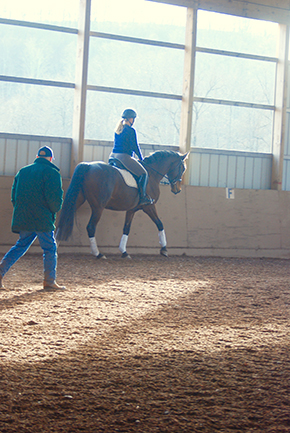 If you live in warmer regions of the country, the early morning will also have the benefit of being the coolest time of day to work your horses. Don’t forget that your competition rides will likely be during the day when temperatures rise, so when you are nearing a competition date, schooling a double session where you ride in the afternoon will be beneficial in preparing both you and your horse for the climatic conditions at the competition.
If you live in warmer regions of the country, the early morning will also have the benefit of being the coolest time of day to work your horses. Don’t forget that your competition rides will likely be during the day when temperatures rise, so when you are nearing a competition date, schooling a double session where you ride in the afternoon will be beneficial in preparing both you and your horse for the climatic conditions at the competition.
For those of us that winter in the colder climes, a warm ‘cuppa’ and something tasty to fill our tummies is a must before we venture out into the cold frosty air. Once you start riding your cadre of horses you’ll soon warm up. Be sure to have the appropriate layers of clothing for both you and your horse for warm up and cool down.
As a professional equestrian, it is imperative that you put the time in to training your horses as a priority. Your success at shows will hinge on your horse’s abilities to complete the tasks you set him in the show ring and to showcase your talents in true partnership. In turn your business will be driven by clients that want you to train them and their horses and the more successful you are the more you can charge for these services and the more of these folks there will be knocking on your barn door. Ultimately this will provide a significant revenue stream, which will allow you to fulfill other goals you may have set yourself, such as owning a horse farm rather than leasing space.
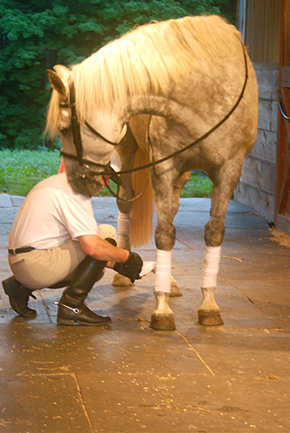 When you are away at competitions, it is important that your client base is well taken care of and that your up and coming horses are not left standing idle. If you know you are consistently on the road competing, be up front with your clients. Most clients fully appreciate that as professionals we need to travel and may spend much time away from home base. For this reason is it imperative to build a trustworthy team to stand behind you while you are away competing. If you put solid work into the right intern or apprentice you can often migrate their duties to a full-time position. This provides the added advantage that this individual has been trained by you in your methods, and ensures consistency in training for the horses and routines around the barn. Mentorship is a very important part of professional success, and hopefully you have enjoyed and continue to enjoy mentorship by someone further up the equestrian ladder during your career. This is valuable knowledge that you can now pass along to a carefully chosen individual that will cheerfully match your work ethic and follow your directions both in the saddle and on the ground.
When you are away at competitions, it is important that your client base is well taken care of and that your up and coming horses are not left standing idle. If you know you are consistently on the road competing, be up front with your clients. Most clients fully appreciate that as professionals we need to travel and may spend much time away from home base. For this reason is it imperative to build a trustworthy team to stand behind you while you are away competing. If you put solid work into the right intern or apprentice you can often migrate their duties to a full-time position. This provides the added advantage that this individual has been trained by you in your methods, and ensures consistency in training for the horses and routines around the barn. Mentorship is a very important part of professional success, and hopefully you have enjoyed and continue to enjoy mentorship by someone further up the equestrian ladder during your career. This is valuable knowledge that you can now pass along to a carefully chosen individual that will cheerfully match your work ethic and follow your directions both in the saddle and on the ground.
Many of us like to remain in full control of everything going on at the barn and with our horses. However, remember that when you delegate work to the right individual that has been properly trained to carry out the job, it frees up more time for us to focus on other tasks. Don’t be shy to let go of the reins and give your protégés a chance to shine. 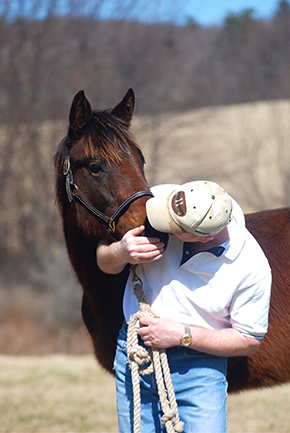
Once your own competition horses have received their workout you can turn your attention to horses you may have in training for others, students that require lessons and take care of day to day office work and calls between times.
Take the time to talk and communicate with your students and clients about how they and their horses are progressing. This helps ensure that small issues or upsets don’t become large ones. Your availability to converse with your clients when you are home will significantly defray any misunderstandings or expectations and you will enjoy their patronage for a longer-term relationship as a result. Never discount how important your undivided attention is to them. Please don’t be the trainer with the cell phone glued to your ear, that sits aboard a tired horse to give a lesson and whose focus is constantly distracted by the phone, or the trainer who breezes about the barn in a mad rush that takes no time to stop and chat and is too taken up with their sense of self-importance.
For many professional equestrians the hardest part of business management is finances. You must allow time to keep records and track all your income and expenses, consult with a knowledgeable accountant and tax professional, and keep a tight rein on your dollar spend.
It may be tempting to go it alone with one client, and stay based at their facility working just their horses and enjoy their financial strength to underwrite your career. This is fine but be aware that when this relationship comes to an end, you will have to start over. Not having to worry about money is wonderful and saves you time, but on the other hand you are not learning how to run a business. Something you will need to learn to manage sooner or later.
To relieve the financial burdens that most professional equestrians suffer, horse sales provide one of the best routes to fund the truck, trailer, travel and show expenses or your next competition horse acquisition. With your stellar reputation and training experience as a professional and network of horse folks you should have little difficulty in finding good horses to train up and sell on.
It is not easy to balance family life and commitments with the long hours that the professional equestrian lifestyle requires. Try to include your family in your event schedule as part of your team where you can, and set your priorities each day as for as horse training, lessons and chores.
I used to show with our young family in tow. Our twins in a side-by-side stroller with their older brother holding tight to the handle beside my husband or myself, kiddie chairs and toys in the trailer dressing room for rainy afternoons and as a place to sit them down for a healthy packed lunch, and constant competition with horse riders for a shady spot under a tree on a hot afternoon were commonplace occurrences.
As the children grew up and we travelled internationally for competitions my husband and I would take turns going abroad and take one of the three with us for the experience while the other stayed home to mind the breeding farm and keep the horses at home in training. Today our now 30 year old daughter fondly remembers trying to navigate the map in Sweden and Germany with the long foreign street names, picking out her favorite stallion at the Celle licensing, our 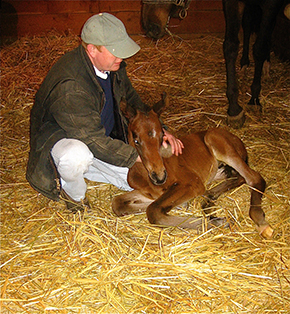 sons remember getting lost in Portugal and Spain trying to find events and playing quietly at the mounting block while we lessoned with iconic dressage names in Florida after long journeys in the RV. Travel does broaden the mind, for all of us!
sons remember getting lost in Portugal and Spain trying to find events and playing quietly at the mounting block while we lessoned with iconic dressage names in Florida after long journeys in the RV. Travel does broaden the mind, for all of us!
When you set up your life in a professional manner you will find that everything will fall into place as a professional equestrian. The life is tiring but can be very rewarding, and following your dream is always doable. Make time your friend, and you’ll be on the right track.
About the author: Nikki Alvin-Smith is an international Grand Prix dressage trainer/clinician who has competed in Europe at the Grand Prix level earning scores of over 72%. Together with her husband Paul, who is also a Grand Prix rider, they operate a private horse breeding/training farm in Stamford, NY.

